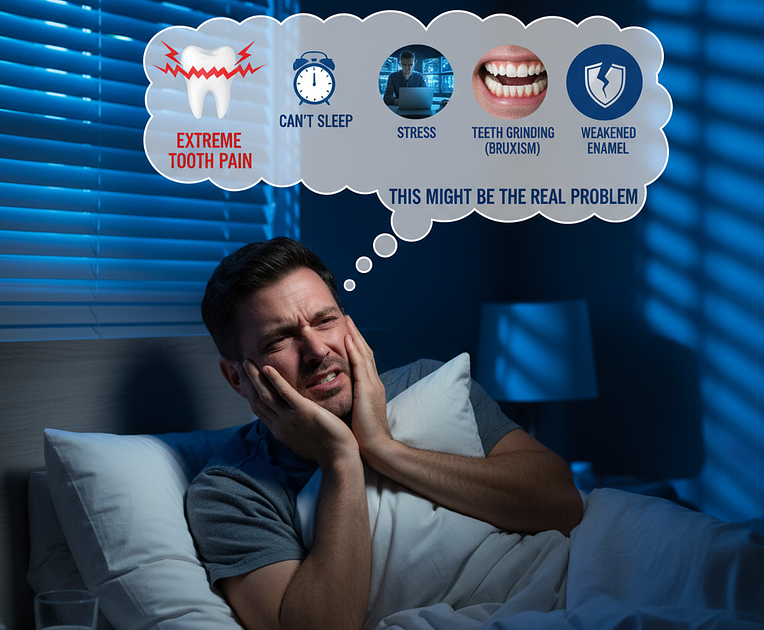Extreme Tooth Pain Can’t Sleep? This Might Be the Real Problem
Extreme tooth pain that keeps you awake at night is more than an inconvenience.
It is often a warning sign of underlying dental issues that require immediate attention. Many people underestimate how lifestyle habits such as smoking can intensify dental problems and make toothache significantly worse.

Understanding what causes severe tooth pain and how different factors, especially smoking, influence your oral health can help you take the right steps toward relief.
Understanding Why Extreme Tooth Pain Happens
Severe tooth pain usually indicates that the nerves inside the tooth or surrounding tissues are inflamed or infected. Common causes include cavities, gum disease, tooth decay, and dental trauma.
When the nerve becomes irritated, the pain can feel sharp, throbbing, or constant. Symptoms may worsen at night because blood flow increases to the head when lying down, intensifying pressure around the affected tooth. You may also notice sensitivity to hot or cold foods, swelling, or fever in advanced cases. Sleep becomes difficult because the underlying cause remains untreated.
Identifying the source is crucial because tooth pain rarely resolves on its own and often signals a deeper infection that needs professional care. Without timely treatment, the problem can progress, leading to more severe complications and greater discomfort.
How Smoking Makes Tooth Pain Worse
While smoking may not directly cause toothache, it contributes significantly to conditions that make tooth pain more intense and harder to heal. Nicotine restricts blood flow to the gums, reducing the supply of oxygen and nutrients required for healthy tissues.
This increases inflammation and slows the body’s natural healing response. Smokers are also more prone to gum disease, a major cause of severe tooth pain. Bacteria thrive when the gums are weakened, leading to infection that spreads deeper into the bone and tissues.
Tar and chemicals from tobacco further irritate the mouth and can mask early symptoms, causing dental issues to remain undetected until the pain becomes extreme. For smokers, even minor dental problems can escalate into unbearable nighttime pain. Healing after dental treatments is also slower, making recovery more uncomfortable and increasing the risk of complications.
know more: Does smoking affect toothache
Managing Severe Tooth Pain as a Smoker
When tooth pain becomes unbearable, especially at night, immediate dental evaluation is essential. Dentists assess the cause through examinations and X rays to determine whether the issue is decay, infection, or gum disease. Smokers often require tailored treatment plans because reduced healing ability affects both the procedure and recovery.

Maintaining good oral hygiene, staying hydrated, and avoiding smoking before appointments can help improve treatment outcomes. Switching to tobacco alternatives may lessen the harmful effects while you work toward quitting. Simple home measures such as warm saltwater rinses, cold compresses, and over the counter pain relievers may provide temporary comfort but do not replace professional care.
Quitting smoking remains the most effective way to improve oral health, enhance healing, and reduce the likelihood of severe tooth pain disrupting your sleep again.
Conclusion
Extreme tooth pain that keeps you awake should never be ignored. Whether caused by decay, infection, or gum disease, smoking can intensify the discomfort and slow the healing process. Understanding the connection between lifestyle habits and oral health empowers you to make better choices and seek timely dental care. Addressing the root cause early can restore comfort, protect your teeth, and help you sleep peacefully again.
FAQ
Why is tooth pain worse at night
Blood flow increases when lying down, creating more pressure and intensifying inflammation around the affected tooth.
Can smoking cause severe tooth pain
Smoking does not directly cause pain but worsens infections, delays
healing, and increases conditions that trigger extreme toothache.
What helps tooth pain temporarily
Saltwater rinses, cold compresses, and over the counter pain relievers may reduce discomfort until you see a dentist.
Do smokers heal slower after dental treatment
Yes. Reduced blood flow and weakened immunity delay healing and increase the risk of complications.
When should I see a dentist for tooth pain
Seek immediate care if the pain is constant, severe, disrupts sleep, or is accompanied by swelling or fever.
Related search:

Comments
Post a Comment